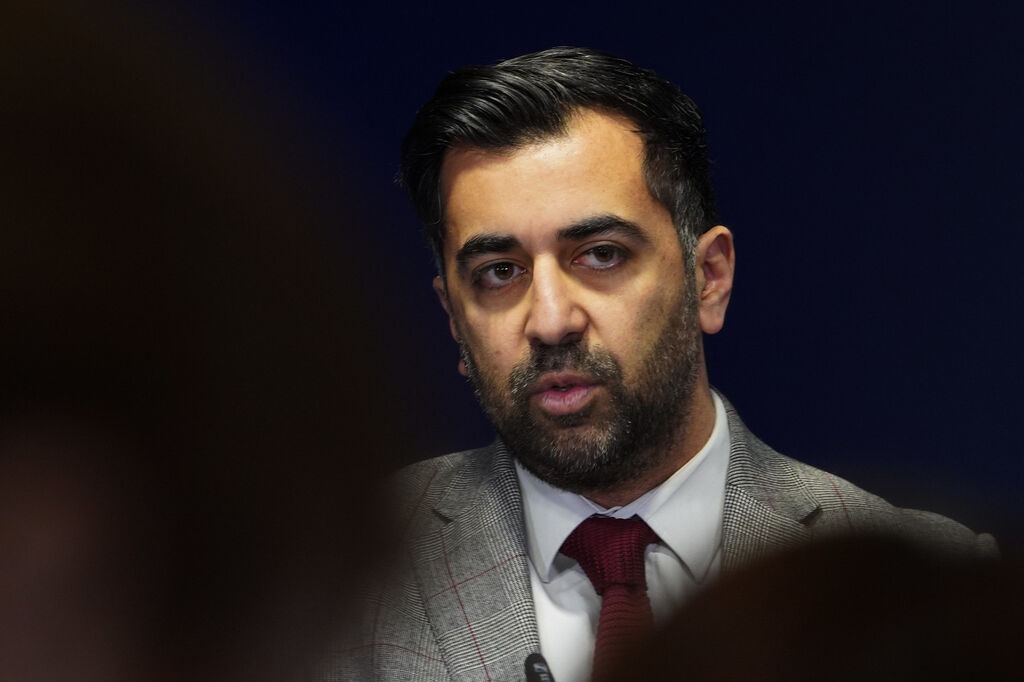Is this the end for Humza Yousaf?

Please note: this article reflects the author’s personal views. CARE is politically neutral.
It’s an age-old trick deployed to save face. If you hear you’re about to be fired, or dumped, get in there first.
That is precisely what Humza Yousaf, Scotland’s First Minister has done. Rumours had been swirling for weeks that the Scottish Greens were going to walk away from their agreement with the SNP. This agreement is known as the Bute House Agreement and was signed after the last Scottish Election.
What led to these rumours? Well, the Scottish Government announced it was watering down a key energy target. You can imagine this did not go down well with the Scottish Green Party. Co-leaders Patrick Harvie and Lorna Slater announced party members would vote on whether to remain in government.
But rather than wait for the Scottish Green Party MSPs to kick him out, and a mere 48 hours after insisting he was committed to the agreement, Yousaf’s decided to get on the front foot.
Following a hastily arranged emergency cabinet meeting on Thursday morning, The FM then made a statement to the press. In his statement, he said that in his view, the compromises required by the agreement were no longer worth it.
After he kicked the Scottish Greens out, the FM then had to go to Holyrood for weekly First Minister Questions.
Then things got really spicy! In scenes reminiscent of the dying days of the Theresa May government and the Boris Johnson government, the leader of the Scottish Conservative and Unionist Party, Douglas Ross, announced he would be tabling a motion of no confidence in the FM.
During the session, the leader of the Scottish Liberal Democrats said his party would back the motion. The Scottish Labour leader also implied he’d back the motion.
No doubt smarting from losing the two ministerial positions (with all the perks that involves, like an official car, eco-friendly no doubt, and a chance to help craft legislation), the Scottish Greens announced they would also be backing the motion.
What happens next?
There’s no doubt the FM is in very real danger. He won the leadership, narrowly beating Kate Forbes to the post. He was following the two biggest beasts of Scottish politics, Nicola Sturgeon, and Alex Salmond.
So what happens if he does lose? It’s important to note that this motion of no confidence is just in Humza Yousaf, not the Scottish government. This means if he loses next week, he’s under no obligation to resign, but the pressure to do so would be massive.
Scottish Labour meanwhile have tabled their own no confidence motion in the Scottish Government. If the SNP lose that vote, it would have 28 days to elect a new first minister and then get that through the parliament – no easy feat! If they failed to get a new first minister in place, that would trigger an early election.
The Bute House Agreement (named after the official residence of the First Minister in Scotland) was the first of its kind at the Scottish Parliament. The Scottish Greens agreed to support the SNP’s legislative agenda, while in exchange, a very small party who would ordinarily have no chance of elected office, secured two key ministerial posts.
The agreement set out how the Scottish government and the Greens planned to work together for the parliament’s five-year term. It included a shared programme which was detailed in a policy document called Working Together to Build a Greener, Fairer, Independent Scotland.
Now the agreement has come to an end, Yousaf is the leader of a minority government. If he wants to get government legislation through, he will have to work with other parties. The same applies to the Scottish Government’s budget.
Except doing deals with other parties will be very difficult for Humza Yousaf. Brian Taylor, BBC Scotland’s former political editor, told the BBC that the atmosphere at the Scottish Parliament was ‘so bitter and astringent that the prospect of deals with other parties is going to be extremely difficult indeed.’
In total, the SNP have 63 seats, and the opposition parties have 65. So, if all opposition parties vote for the Douglas Ross motion, Humza Yousaf will lose the vote of no confidence.
One of those 65 opposition MPs is Ash Regan. Readers may remember her as one of the three candidates who stood for election as SNP leader to follow Nicola Sturgeon. Since losing that contest, she has defected to Alex Salmond’s Alba Party and currently sits as their only MSP.
She has apparently written to Humza Yousaf setting out her terms if she’s to back him in the vote.
It is hugely ironic that his fate might rest in her hands. When she defected from the SNP, Mr Yousaf said she was ‘no great loss’. Yet his political future could very well sit in her hands.
Poor Humza Yousaf. This is a perilous moment for him. And he made this announcement on the same day as First Minister’s Questions (FMQs). Opposition parties sensed weakness and they went for the jugular. All in all, you have to say it was a pretty unedifying spectacle.
Convicted Civility
At CARE, we’re interested in communicating truth with grace. One theologian has called this convicted civility. By all means, we must be free to believe things (not guaranteed thanks to the Scottish Government’s ill-conceived Hate Crime Act). But we all carry a responsibility to speak the truth in love, in a gracious, respectful way.
Such qualities were lacking from all sides of the debate. Opposition parties were relishing the opportunity to score plenty of political points. For some, who have weathered the longs years of the total dominance of Scottish politics by the SNP, it must be hugely rewarding to see the SNP in such trouble.
Yet I can’t help feeling sorry for Mr Yousaf. He’s someone who has demonstrated a willingness to work with others on different pieces of legislation in the past. He’s inherited the job as SNP leader just as the tide seems to be going out on them. To be leader during the twilight of a once all-conquering political machine must be tough.
At the same time, the FM hardly set a good example during Thursday's FMQs. Clearly provoked, and undeniably under huge pressure, he mainly responded with a range of personal insults. This will only further contribute to dragging Scottish politics to an even darker place.
It has been 25 years since the devolution settlement and the Scottish Parliament was created. At a recent event hosted by Holyrood sources, the great and the good of Scottish politics passed verdict. At best it was mixed. If it was a school report, the main headline would definitely be: could do better.
All too often, the Scottish Government has almost deliberately and provocatively chosen to take the most progressive path, even in the face of evidence and opposition. The Gender Recognition Reform Act is a prime example. How much more foolish does this legislation appear now, in light of the Cass Report?
Or what about the Named Person Scheme? This legislation aimed to ensure every child in Scotland had a state appointed ‘guardian’, responsible for the ‘wellbeing’ of every child, which was broadened out to include all manner of things the state should have no oversight of. Fundamentally, this legislation was struck down by the UK Supreme Court. From CARE’s perspective, the proposed law would have allowed a state appointed guardian to overrule and override parents, further eroding parental rights.
And what about ending the Bute House Agreement? In his statement, Mr Yousaf would have us believe the agreement had served its purpose and so why continue with it?
But surely a more plausible explanation is that as party leader, Mr Yousaf has had to bow to pressure from a wing of his own party that simply does not want the deal to carry on.
In other words, this is not about what is in the best interests of Scotland. It is all about the best interests of the current First Minister.
Maybe I’m being unfair. And I do have to be careful because the LORD alone knows the heart of the man. But it does seem to me like this is a form of politics, all too familiar, which we would do well to challenge.
What is politics?
After all, what is politics? Perhaps most of us hear the word and immediately we start thinking of power grabs, opportunism, the scheming, the plotting and so on.
But politics at its most simple, is about making decisions for the common good. “Political victories that undermine trust in politics shouldn’t be considered victories; they’re net losses for society.” That’s what Robert B Reich, former US Secretary of State for Labour said in his book on the common good. And he’s right.
Or, to put it another way: politics is not primarily about power grabs, plotting, or posturing. Politics is about people.
I’m not denying that in the context of a fallen world, politics does also involve all those negative realities. And nor do I think it is wrong, necessarily, for a vote of no confidence to be held, or for there to be a degree of backroom deals and arrangements. Such activities can be both necessary and honourable.
In fact, this is part of the Scotland Act, the legislation that established the Scottish Parliament. It is a good thing that there are mechanisms for opposition parties to remove First Ministers. Praise God such an option is even there!
But in the Bible and in theology, we talk about primary truths and secondary truths. So, as 1 Corinthians 15:1-8 says, the gospel is of ‘first importance’. Other doctrines, like the doctrine of end times are sometimes called secondary doctrines.
This does not mean they are unimportant. It means that they are not as crucial as the gospel.
When it comes to politics, we could apply the same schema. The people-focused nature of politics should be of first importance. Every decision made in places like the Scottish Parliament has a direct impact on people, all of whom are made in God’s own image.
Whereas the side of politics that involves deals and party politics might be considered of secondary importance. But the problem is we so often end up reversing this order. And politics in Scotland and elsewhere is all the poorer for it.
When the truth that politics is about people is front and centre, I’d argue that you see an uptick in serious debates. Politicians genuinely debate the substance of policies and make good, effective improvements to them. You see less of the clashes between personalities and more co-operation.
The real irony in all this is that the Scottish Parliament was deliberately designed to encourage co-operation. Even the shape of the debating chamber speaks to this reality.
At CARE, we are for people before power, personalities, or posturing. The Christian worldview teaches us that all human beings are image bearers and crowned with glory and honour (Psalm 8:4-5). When this reality is believed in and kept front and centre, politics will be a source of blessing, rather than a curse.






